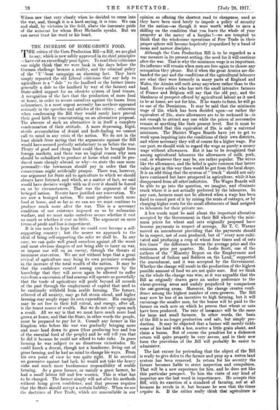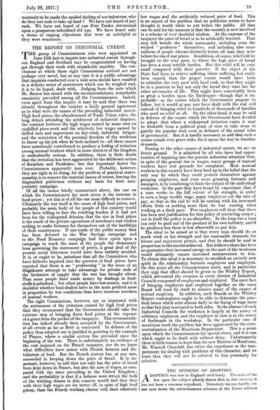THE INCREASE OF HOME-GROWN FOOD. MITE critics of the Corn
Production Bill—a Bill, we angled to say, which is now safely approved in its chief principles —have cut an exceedingly poor figure. To read their criticisms one might think that we were back in the days before the German challenge became a reality, and the criminal policy of the `11 '-boat campaign an alarming fact. They have simply repeated the old Liberal criticisms that any help to agriculture is a " dole " to the landlord or the farmer (more generally a dole to the landlord by way of the farmer) and State-aided support for an obsolete system of land tenure. A recognition of the fact that the production of more food at home, in order to secure ourselves against the losses from submarines, is a most urgent necessity has nowhere appeared seriously in the speeches and articles of the Critics ; otherwise when condemning the Bill they would surely have proved their good faith by concentrating on an alternative proposal. The absence of such an alternative is in itself a complete condemnation of their attitude. A more depressing, frigid, sterile accumulation of denial and fault-finding we cannot call to mind in any crisis of the nation. We do not in the least shrink from saying that the arguments against the Bill would have seemed perfectly satisfactory to us before the war. Plenty of good and cheap food could then be brought from foreign markets, and there was no logical reason why men should be subsidized to produce at home what could be pro- duced more cheaply abroad, or why—to state the case more personally—the townsman should pay in order that the countryman might artificially prosper. There was, however, one argument for State aid to agriculture to which we should always have listened, and which, as a matter of fact, we said would have decisive weight with us if ever it should be forced on us by circumstances. That was the argument of the besieged nation. Events have justified our reservation. We are now a besieged nation. We must produce much more food at home, and so far as we can see we must continue to produce much more after the war. This is a necessary condition of our existence imposed on us by submarine warfare, and we must make ourselves secure whether it cost us much or whether it cost us little. The argument on mere terms of profit and loss is impertinent.
It is too much to hope that we could ever become a self- supporting country ; but the nearer we approach to the ideal of being self-supporting the safer we shall be. In any case, we can quite well guard ourselves against all the worst and most obvious dangers of not being able to carry on war, or impose our will on an enemy, through the threats of imminent starvation. We are not without hope that a great revival of agriculture may bring its own pecuniary rewards in the increase of the total wealth of the nation. It may be that the confidence created among coin-growers by the knowledge that they will never again be allowed to suffer ruin from a succession of bad seasons will operate so powerfully that the trade of agriculture will profit beyond all records of the past through the employment of capital that used to he cautiously withheld from arable farming. The farmer, relieved of all anxiety, may go full steam ahead, and higher farming may amply repay its own expenditure. His energies rimy be set free to their full extent, and energy, after all, is the truest source of wealth. But we do not rely upon such a result. All we say is that we must have much more food grown at home, and that the State, in other words the people, must be prepared to pay for it. Consult any farmer in the kingdom who before the war was gradually bringing more and more land down to grass (thus producing less and less of the essential food of the people) and he will tell you that he did it because be could not afford to take risks. In grass farming he was subject to no disastrous vicissitudes. He could knock a decent, though not a handsome, living out of grass farming, and he had no mind to change his ways. From his own point of view he was quite right. If he received no guarantee against bad luck, he would not take the heavy risks and much more burdensome responsibility of arable farming. As a grass farmer, or mainly a grass farmer, he had a small labour bill and few worries. This is what has to be changed. The farmer simply will not alter his methods without being given confidence, and that process requires that the State should accept a cettain liability. When we see the doctrihes of Free Trade, which are unassailable' in our
opinion as offering the shortest road to cheapness, used as they have been used lately to impede a policy of security fer the nation—as though it were worth while to save a shilling on the condition that you leave the whole of your property at the mercy of a burglar !--we are tempted to think that the wholesome operations of Free Trade in their Proper sphere will become hopelessly jeopardized by a band of mean and-narrow disciples.
Although the Coin Production Bill is to be regarded as a war measure in its present setting, the need for it will continue after the war. That-is why the minimum wage is so important. Its influence will remain when men are free again to choose any occupation they please. But if when the great Armies are dis- banded the pay and the conditions of the agricultural labourer are. what they were formerly in many parts of England and Wales, the Armies will melt away anywhere rather than to the land. Every soldier who has met the email intensive farmers of France and Belgium will say that the old pay, and the blankness of prospect offered by agricultural labour as it used to be at home, are not for him. If he wants to farm, he will go to one of the Dominions. It may be said that the minimum wage of 25s. which has been decided upon—or rather the equivalent of 25s., since allowances are to be reckoned in—is not enough to attract any one while the prices of necessaries remain at anything like their present level. But it must be remembered that this equivalent of 25e. is only a universal minimum. The District Wages Boards have yet to get to work upon inquiring into the conditions of their own districts, and where necessary they will of course fix a higher wage. For our part, we should wish to regard the wage as purely a money wage without allowances. But it has to be recognized that among agricultural labourers the allowances of milk, pork, coal, or whatever they may be, are rather popular. The wives like the allowances, and the belief is quite common that better value is got in this way than would be got from the local shops. It is an odd thing that the system of" truck " should not only have continued but have prospered in agriculture, while it has disappeared from all other industries. The Wages Beanie will be able to go into the question, we imagine, and eliminate truck where it is not actually preferred by the labourers. In any case, farmers must not be allowed when a wage has been fixed to cancel part of it by raising the rents of cottages, or by charging higher rents for the small allotments of land assigned to labourers for their private use.
A few words must be said about the important alteration accepted by the Government in their Bill whereby the mini- mum prices for wheat and oats originally proposed have become payments in respect of acreage. Sir T. C. Warner moved an amendment providing that the payments should be in respect, not of corn produced, but of "every acre culti- vated and producing a crop of wheat four times and of oats five times" the difference between the average price and the minimum price per quarter. Mr. Leslie Scott, one of the authors of the " Minority Report on the Employment and Settlement of Sailors and Soldiers on the Land," supported the amendment, and it was accepted by the Government. Whether the change will result in the production of the highest possible amount of food we are not quite sure. But we think on the whole the change was wise, as it was arguable that the Bill as originally drawn gave an undue preference to the wheat-growing areas and unduly prejudiced by comparison the oat-growing areas. Moreover, the change creates confi- dence among the highest number of corn-growers. The Bill may now be less of an incentive to high farming, but it will encourage the smaller men, for the bonus will be paid to the farmer on each acre on which he proves that wheat or oats have been produced. The rate of insurance will be the same for large and small farmers. In other words, the basis of the Bill is no longer production and sale, but simply pro- duction. It may be Objected that a farmer will merely tickle some of his land with a hoe, scatter a little grain about, and claim a bonus. But of course the penalties for a dishonest return will quite properly be very severe, and in their new form the prey:Inoue of the Bill will probably be easier to administer.
The last exam for pretending that the object of the Bill is really to give doles to the farmer and prop up a rotten land system has been removed. In return for his security the farmer becomes liable to strict inspection and compulsion. That will be a new experience for him, and he does not like this particular prospect. To him the visits of any kind of inspector are the last word in impertinence. He accepts this Bill, with its exaction of a standard of farming, not at all because he revels in it, but because he sees that the times tequite it. If the critics really think that -agriculture is
wantonlyto be maderthe spoiled darling of onrindustrieu, why do they not rush totake irp land I We have not heard of any rush. We have not heard of one Free Trader determined upon a prosperous subsidized old age. We have heard only a drone of carping objections that were as unhelpful as they were wearisome.



































 Previous page
Previous page